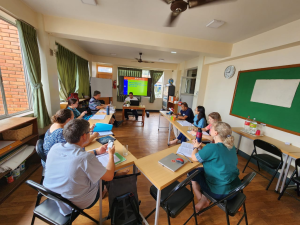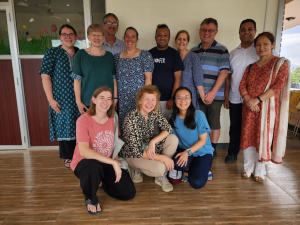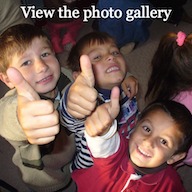The days Lora and I have been going into the UMN office, we have been trying to bike. It’s a quick fifteen-minute ride through traffic that is generally not very intimidating. The bike lanes painted on the main road are a nice gesture, but when drivers don’t really respect the dotted middle line it’s asking a lot for them not to get in our space. But it’s ok. Most traffic never goes faster than 15 or 20 mph. These weeks, however, have often been rainy so we have taken a taxi or the bus to get to and from work. And we are glad for our trusty umbrellas. This past Tuesday when we arrived at work in the taxi we found that many of our colleagues were delayed because of the rain. One co-worker even emailed Lora halfway through the morning that she was giving up on getting to the office because her taxi had already been held up in traffic for over two hours. We were lucky and didn’t have any traffic jams on the way.
In the three weeks we have been back in Kathmandu from Thailand, we first had one week of work, then a week of cultural orientation, and another week of work, which was this past week. The in-between week of cultural orientation was very interesting, useful, and generally enjoyable. United Mission to Nepal usually makes this orientation week available to new expats within their first few months of arrival. Our orientation week happened well after our arrival for various scheduling difficulties but was just as useful even though we were familiar with many of the things covered.
We were in a group with eight other recently arrived expats and taught by a wonderful, thoughtful and intelligent Nepali man named Dinesh, as well as by other Nepali folks whom he invited for specific topics. The class taught about Nepali history, festivals, traditions, food, religion (Hindu, Buddhist, and Christian), and current politics. We heard from Nepali Christian pastors, the former Nepali UN Ambassador, a university professor of Eastern Religion, and even Dinesh’s wife, Rheka.
One afternoon we also visited a fair-trade factory (www.purnaa.com ) on the outskirts of Kathmandu. They mostly employ women who were either trafficked or physically abused or otherwise had few employment opportunities. Their customers place orders of everything from baseball caps and women’s jackets to stuffed animals and fuzzy felt slippers. The products from the factory of a few hundred workers are sent all over the world. But right now the company is having to deal with the fact that the narrow road of about a half mile which connects them to the main road was largely washed away by the monsoon a few weeks ago. It means that the raw materials coming in as well as the finished products being sent away have to travel on motorbikes, which for obvious reasons cannot handle very much at a time.
In the weeks before and after the orientation, we have been getting more and more settled into our roles here at UMN. Coming into Nepal over a half year ago, I had a general sense that my job as Expatriate Coordinator was going to be about arranging visas, welcoming new hires, tracking down paperwork, corresponding with potential candidates, and recruiting. It has been all of that, but much more than that. It has also been learning how to turn in receipts for a meal that is covered by work, or for a stack of Kathmandu city maps purchased for the next round of new arrivals. I was surprised to find out the actual receipt is needed, not a photo of it and not a screenshot of the online bill-pay transaction. The receipt also has to be glued onto a piece of letter-sized paper for easier filing. And when filling out the reimbursement form, an actual piece of carbon copy paper is used. (Watch out for smudges!) True, my old job didn’t require much of this kind of paperwork so maybe I’m just naive, but I expected to be able to photocopy the finished paperwork and not use carbon copy paper!
Thankfully not much of my job requires turning in receipts. A lot more of it is meeting with people in person or sending and reading emails. Last week I met with the hiring team at the UMN office to talk about a new potential applicant for one of the positions our website has had open for a few weeks. We usually look at the applicant’s resume and try to ascertain whether they would be a good fit for the job description that was written up by the people here. In any particular case, it might merit the next step of scheduling an online meeting with the candidate, who is usually quite a few time zones away. This takes another round of emails on my part.
Lora and I are also hard at work getting everything ready to welcome the first new doctor and family to Kathmandu later this month. (Well, the first doctor for us in our roles at least. There are currently about 20 doctors and their families in the UMN hospitals already.) We are making sure the new family has what they need at the apartment they are renting, sight unseen. Luckily, there are mutual friends in the building who can vouch for the landlord, and it’s only about a six or seven-minute walk from our house. So, we are expecting to be able to help out on short notice with whatever they might need for the 5 months of language and culture study they will be in Kathmandu before heading out to the rural hospital they hope to work at for the indefinite future.
One other thing Lora and I are doing together is streamlining the application process. It has been a few years since some of the materials have been updated, and certain aspects of life here in Nepal have changed since 2018.
Sometimes my job is to explain in an email to interested medical workers whether or not they are qualified to obtain a work visa by the Nepali government. I learned last month that although less than a decade ago a registered nurse from abroad could come to one of our hospitals and work as a volunteer, nowadays that nurse can’t even help out short term. This is actually good news because the reason for this change is that qualified Nepali nurses are much easier to find, due to the improved medical schools in recent years. So even though in the past an expat nurse would come to work as a volunteer (supported by a sending agency such as Mennonite Mission Network, Canada Witness, Interserve or The Presbyterian Church in Canada) that job will better serve the people of Nepal by being filled by a Nepali national.
That said, there are still jobs here for expats as surgeons, paediatricians, general practitioners, anesthesiologists, physical therapists, IT workers, and engineers largely in the two rural hospitals of UMN, as well as positions of funding manager, grant writer, communications advisor, human resources development advisor and others based in Kathmandu. In fact, you can find the latest job postings here: https://www.umn.org.np/expat-volunteers/ We’d love to welcome you to Nepal too!




